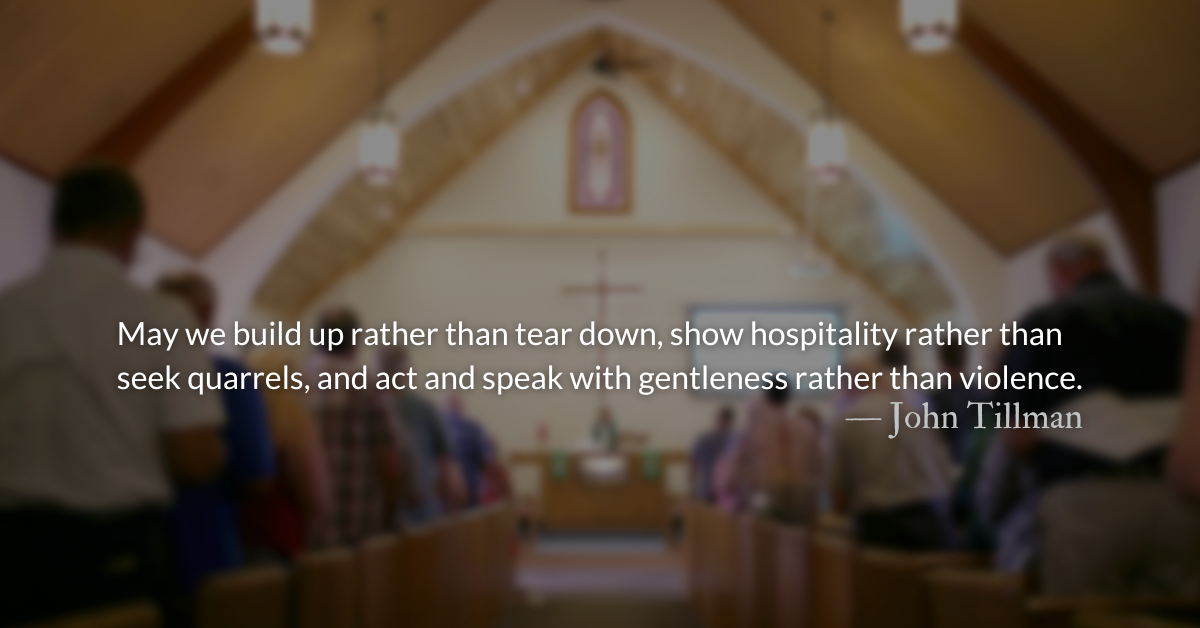Scripture Focus: 1 Timothy 3.1-3
1 Here is a trustworthy saying: Whoever aspires to be an overseer desires a noble task. 2 Now the overseer is to be above reproach, faithful to his wife, temperate, self-controlled, respectable, hospitable, able to teach, 3 not given to drunkenness, not violent but gentle, not quarrelsome, not a lover of money.
Ephesians 4.11-12
11 So Christ himself gave the apostles, the prophets, the evangelists, the pastors and teachers, 12 to equip his people for works of service, so that the body of Christ may be built up.
Reflection: Choosing and Being Worthy Overseers
By John Tillman
Paul gave Timothy guidance as he sought elders or “overseers” to help shape the theology and character of the Ephesian church.
Christians across history have equated “overseer” in this passage to the role of “elder” or “pastor” in the church. However, in the NIV translation the word “pastor” only appears once. It is in a list Paul gives of individuals who are Christ’s gifts to the church. (Ephesians 4.11-12)
“Apostles” testified to the resurrection of Christ. Prophets spoke words of truth about the present and about the future. Evangelists left their cultures and comforts to spread the gospel. The literal meaning of “pastor” is “shepherd” and it is often considered to be combined with “teacher,” making the one role “pastor-teacher” the last role in Paul’s list. Pastor-teachers instructed, led, and guided the “flock” of local communities. These roles today often overlap and combine. Modern Christians may expect the pastor of a church to operate in all of these roles.
Christians today often choose not only our local pastors but other voices to lead and guide us. Podcasts, Tweets, articles, and email lists (Thank you, subscribers!) contribute to our discipleship. We also are shaped and guided by the non-Christian media we choose. In many cases we may be shaped more by secular political media than by Christian voices or our local church. The question is, are we choosing our “overseers” wisely?
There would not be a need for Paul’s checklist if everyone who sought to lead was qualified. Desire to lead does not equal qualification to lead. Even those currently in a position of leadership may become disqualified. Not everyone who cries, “Lord, Lord,” knows the Lord (Matthew 7.21-23) and not everyone who speaks for God, does so faithfully. (Ezekiel 22.27-29)
Who do we choose to shape our theology and character? How would the voices we follow change if we applied Paul’s checklist to them? Additionally, in the church, in our community, or in our homes, one may be called to be a shepherd-teacher. How can we become worthy of this role?
May we choose worthy overseers and, even if we never stand behind a pulpit, may we stand, representing Christ in a worthy manner. May we build up rather than tear down, show hospitality rather than seek quarrels, and act and speak with gentleness rather than violence. May we choose and become overseers who are as noble as the task.
Divine Hours Prayer: The Call to Prayer
Be strong and let your heart take courage, all you who wait for the Lord. — Psalm 31.24
– From The Divine Hours: Prayers for Summertime by Phyllis Tickle.
Today’s Readings
Ezekiel 31 (Listen 3:31)
1 Timothy 3 (Listen 2:10)
Read more about Hearing the Groans of the Prisoners
He hears the cries of all those oppressed by their rulers. He judges all rulers and leaders who conduct themselves with pride and irresponsibility.
Read more about Christless Forgiveness is the Absence of Justice
Without Christ, forgiveness is anarchy. What Christ offers, however, is a unique definition of forgiveness and justice.









